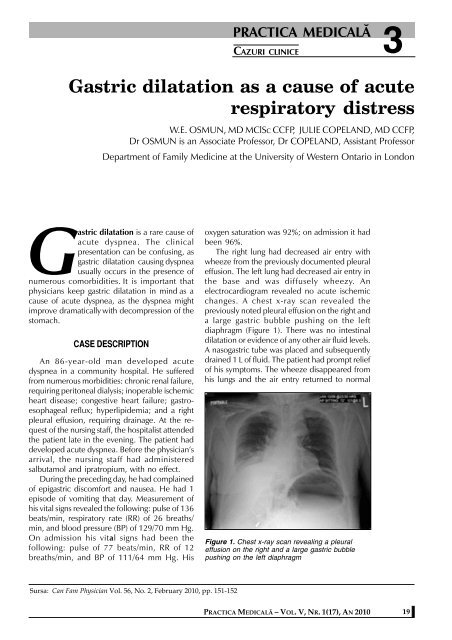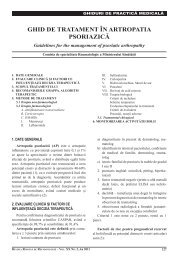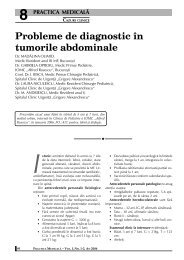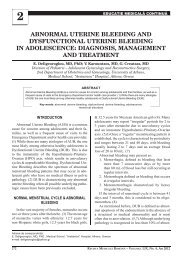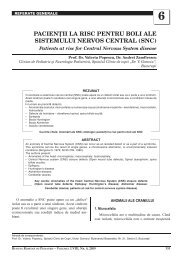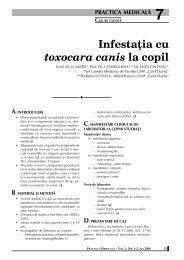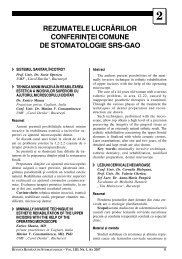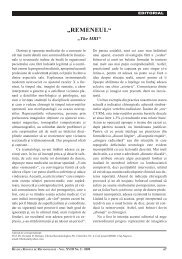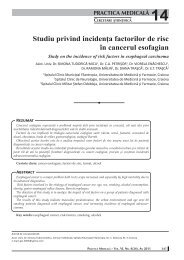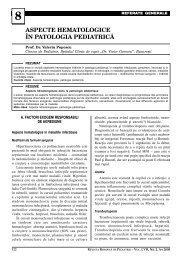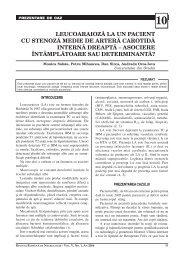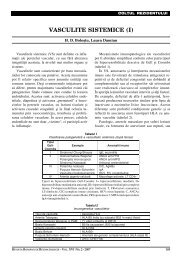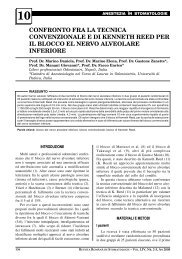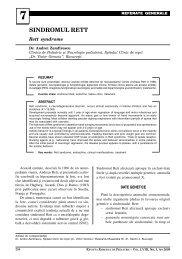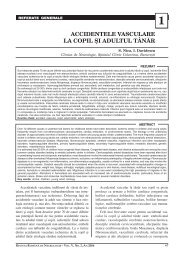Practica Medicala - 2010 - Nr.1.P65 - medica.ro
Practica Medicala - 2010 - Nr.1.P65 - medica.ro
Practica Medicala - 2010 - Nr.1.P65 - medica.ro
Create successful ePaper yourself
Turn your PDF publications into a flip-book with our unique Google optimized e-Paper software.
Gastric dilatation as a cause of acute<br />
respiratory distress<br />
W.E. OSMUN, MD MClSc CCFP, JULIE COPELAND, MD CCFP,<br />
Dr OSMUN is an Associate P<strong>ro</strong>fessor, Dr COPELAND, Assistant P<strong>ro</strong>fessor<br />
Department of Family Medicine at the University of Western Ontario in London<br />
Gastric dilatation is a rare cause of<br />
acute dyspnea. The clinical<br />
presentation can be confusing, as<br />
gastric dilatation causing dyspnea<br />
usually occurs in the presence of<br />
nume<strong>ro</strong>us comorbidities. It is important that<br />
physicians keep gastric dilatation in mind as a<br />
cause of acute dyspnea, as the dyspnea might<br />
imp<strong>ro</strong>ve dramatically with decompression of the<br />
stomach.<br />
CASE DESCRIPTION<br />
An 86-year-old man developed acute<br />
dyspnea in a community hospital. He suffered<br />
f<strong>ro</strong>m nume<strong>ro</strong>us morbidities: ch<strong>ro</strong>nic renal failure,<br />
requiring peritoneal dialysis; inoperable ischemic<br />
heart disease; congestive heart failure; gast<strong>ro</strong>esophageal<br />
reflux; hyperlipidemia; and a right<br />
pleural effusion, requiring drainage. At the request<br />
of the nursing staff, the hospitalist attended<br />
the patient late in the evening. The patient had<br />
developed acute dyspnea. Before the physician’s<br />
arrival, the nursing staff had administered<br />
salbutamol and iprat<strong>ro</strong>pium, with no effect.<br />
During the preceding day, he had complained<br />
of epigastric discomfort and nausea. He had 1<br />
episode of vomiting that day. Measurement of<br />
his vital signs revealed the following: pulse of 136<br />
beats/min, respiratory rate (RR) of 26 breaths/<br />
min, and blood pressure (BP) of 129/70 mm Hg.<br />
On admission his vital signs had been the<br />
following: pulse of 77 beats/min, RR of 12<br />
breaths/min, and BP of 111/64 mm Hg. His<br />
Sursa: Can Fam Physician Vol. 56, No. 2, February <st<strong>ro</strong>ng>2010</st<strong>ro</strong>ng>, pp. 151-152<br />
PRACTICA MEDICALÅ<br />
CAZURI CLINICE<br />
oxygen saturation was 92%; on admission it had<br />
been 96%.<br />
The right lung had decreased air entry with<br />
wheeze f<strong>ro</strong>m the previously documented pleural<br />
effusion. The left lung had decreased air entry in<br />
the base and was diffusely wheezy. An<br />
elect<strong>ro</strong>cardiogram revealed no acute ischemic<br />
changes. A chest x-ray scan revealed the<br />
previously noted pleural effusion on the right and<br />
a large gastric bubble pushing on the left<br />
diaphragm (Figure 1). There was no intestinal<br />
dilatation or evidence of any other air fluid levels.<br />
A nasogastric tube was placed and subsequently<br />
drained 1 L of fluid. The patient had p<strong>ro</strong>mpt relief<br />
of his symptoms. The wheeze disappeared f<strong>ro</strong>m<br />
his lungs and the air entry returned to normal<br />
Figure 1. Chest x-ray scan revealing a pleural<br />
effusion on the right and a large gastric bubble<br />
pushing on the left diaphragm<br />
3<br />
PRACTICA MEDICALÅ – VOL. V, NR. 1(17), AN <st<strong>ro</strong>ng>2010</st<strong>ro</strong>ng> 19
GASTRIC DILATATION AS A CAUSE OF ACUTE RESPIRATORY DISTRESS<br />
20<br />
BIBLIOGRAFIE<br />
on the left. His pulse d<strong>ro</strong>pped to 107 beats/min;<br />
his RR was 20 breaths/min and his BP was 122/<br />
57 mm Hg. The following morning an x-ray scan<br />
revealed a diminished gastric bubble and no<br />
evidence of free air or bowel obstruction. The<br />
nasogastric tube was removed 2 days after<br />
insertion, with no sequelae. <br />
DISCUSSION<br />
The causes of gastric dilatation, which can<br />
occur in all age g<strong>ro</strong>ups, are poorly understood.<br />
Gastric dilatation, however, rarely causes serious<br />
difficulties and is self-limiting. It can cause<br />
dyspnea either postoperatively or as a result of<br />
an underlying structural abnormality.<br />
This case is unusual in that the patient was<br />
not suffering f<strong>ro</strong>m a postoperative ileus and did<br />
not have an underlying structural abnormality,<br />
in the form of a hiatal or diaphragmatic hernia,<br />
or a skeletal abnormality, such as kyphoscoliosis;<br />
but he did have a pre-existing right pleural<br />
effusion and ischemic heart disease, both of which<br />
might have made him more susceptible to the<br />
loss of lung volume as a result of the enlarged<br />
stomach. He did not suffer f<strong>ro</strong>m diabetes, which<br />
could have resulted in a gast<strong>ro</strong>paresis. There was<br />
no cause ascertained for the dilatation. It could<br />
have been a result of anxiety causing ae<strong>ro</strong>phagia.<br />
While other morbidities contributed to the<br />
patient’s acute dyspnea, the dramatic relief of<br />
the patient’s symptoms with decompression<br />
supports the gastric dilatation as the main cause.<br />
Gastric dilatation usually only causes serious<br />
p<strong>ro</strong>blems in the context of other structural<br />
abnormalities. If the dilatation occurs in the<br />
presence of a diaphragmatic or hiatal hernia, it<br />
can cause compression of the lungs and tracheal<br />
deviation. (1–4) Gastric rupture as a result of<br />
gastric dilatation has been reported to have caused<br />
1. Berkman N, Simon Z, Almog Y, Kramer<br />
MR – Acute gastric dilatation causing<br />
respiratory failure and “tension<br />
pneumothorax” in an elderly woman with a<br />
diaphragmatic hernia. Chest<br />
1993;104(1):317–8.<br />
2. Hanekamp LA, Toben FM – A pregnant<br />
woman with shortness of breath. Neth J<br />
Med 2006;64(3):84, 95.<br />
3. Reardon DJ, Freschini A, Harrison M,<br />
Coulson C, Nangalia LL – Oesophageal<br />
dilatation due to a paraoesophageal hernia<br />
and gastric volvulus as a cause of stridor.<br />
Emerg Med J 2007;24(10):734.<br />
4. Narendranathan M, Kalam A –<br />
Respiratory distress during endoscopy—<br />
report of an unusual case. Postgrad Med J<br />
1987;63(743):805–6.<br />
PRACTICA MEDICALÅ – VOL. V, NR. 1(17), AN <st<strong>ro</strong>ng>2010</st<strong>ro</strong>ng><br />
death in patients with severe cerebral palsy. In<br />
these cases the dilatation might be caused by<br />
ae<strong>ro</strong>phagia as a result of autonomic neu<strong>ro</strong>pathy,<br />
malposition of the stomach, or severe<br />
kyphoscoliosis. (5) Gastric dilatation has been<br />
reported to cause sudden respiratory distress<br />
postoperatively as a result of abdominal<br />
compartment synd<strong>ro</strong>me. (6) Postoperative ileus<br />
with subsequent gastric dilatation is not<br />
uncommon, although it usually resolves without<br />
serious sequelae; however, rarely it can cause<br />
sudden deterioration requiring p<strong>ro</strong>mpt gastric<br />
decompression. (7) <br />
CONCLUSION<br />
Early recognition of gastric dilatation with<br />
p<strong>ro</strong>mpt decompression will usually result in<br />
immediate imp<strong>ro</strong>vement in the patient’s<br />
condition. It is important to keep gastric dilatation<br />
on the differential diagnosis for dyspnea,<br />
especially in the face of other comorbidities,<br />
which might distract the investigation but p<strong>ro</strong>ve<br />
not to be the cause of the patient’s distress.<br />
Editor’s key points<br />
Gastric dilatation causing dyspnea usually<br />
occurs in the presence of nume<strong>ro</strong>us comorbidities;<br />
therefore, the clinical presentation can<br />
be confusing. It is important to consider gastric<br />
dilatation in the differential diagnosis for<br />
dyspnea.<br />
Gastric dilatation can cause dyspnea either<br />
postoperatively or as a result of an underlying<br />
structural abnormality, although no underlying<br />
cause was determined in the case presented.<br />
Early recognition of gastric dilatation with<br />
p<strong>ro</strong>mpt decompression will usually result in<br />
immediate imp<strong>ro</strong>vement in the patient’s condition.<br />
5. Byard RW, Couper RT, Cohle S – Gastric<br />
distention, cerebral palsy and unexpected<br />
death. J Clin Forensic Med 2001;8(2):81–5.<br />
6. Mahajna A, Mitkal S, Krausz MM –<br />
Postoperative gastric dilatation causing<br />
abdominal compartment synd<strong>ro</strong>me. World J<br />
Emerg Surg 2008;3:7.<br />
7. Lee LS, Lim NL – Severe acute gastric<br />
dilatation causing respiratory failure.<br />
Singapore Med J 2006;47(8):716–8.


